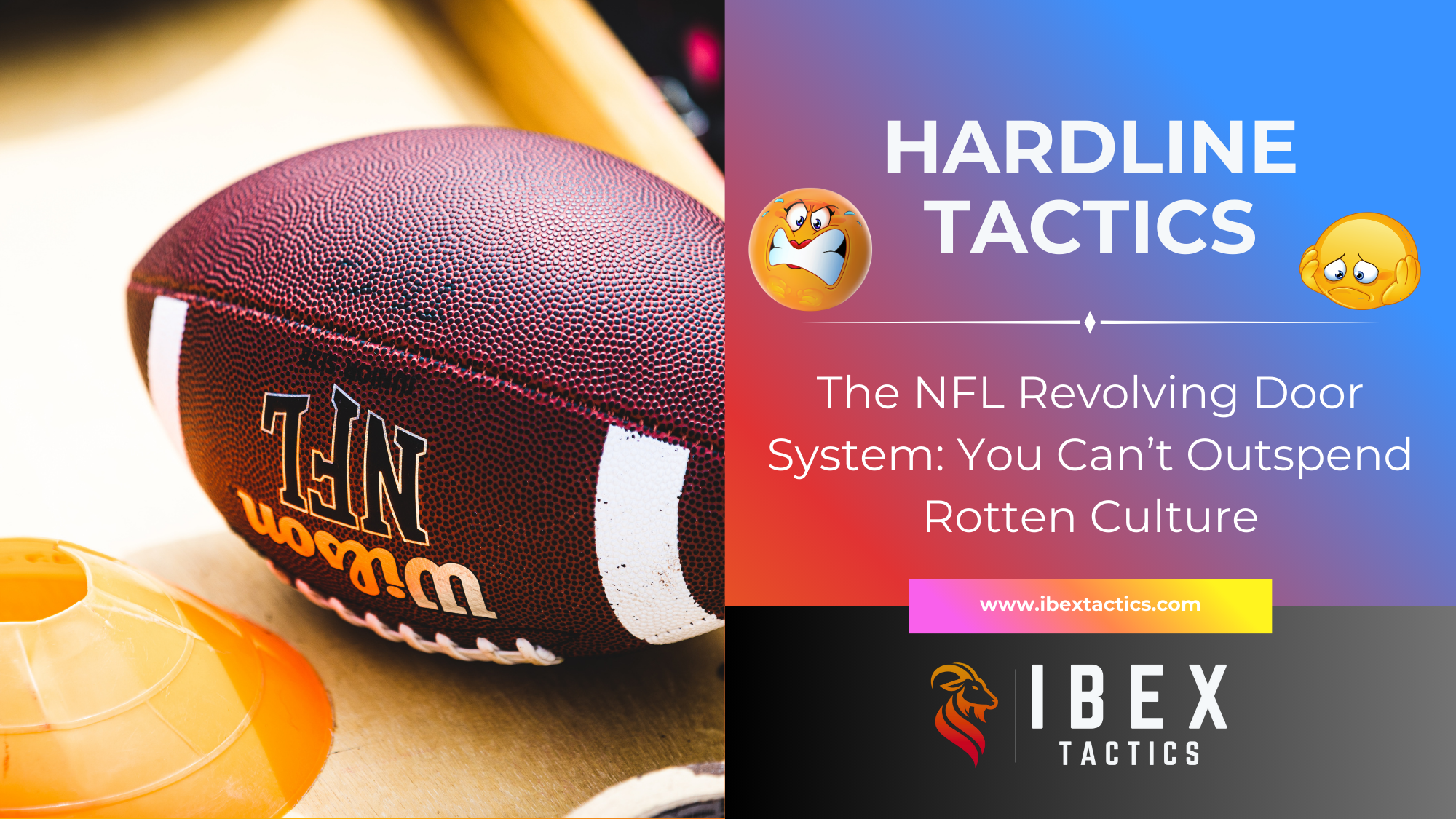The Carolina Way Was A Culture…Now It’s Just A Slogan
About Case Study Authors
Ibex Tactics LLC, was founded by Alex Bolowich & Ben Foodman. Before starting the company, Alex and Ben were working with athletes on an individual basis, helping them improve their mental performance using sport psychology-based interventions. While both professionals had incredible success working with some of the world’s most elite athletes, a significant portion of the time they were unable to help some of their clients due to the poor cultures these athletes were immersed in. As a result, Alex and Ben created Ibex Tactics LLC, which dedicated towards providing science-driven solutions to helping teams build resilient cultures.
Introduction: Tarheel Football & The UNC Athletic DeparTMENT
If you RAGE CLICKED on this article, or if you have your popcorn ready as you prepare to read how we are going to SHRED THE TARHEELS TO PIECES…you should stop reading this now! We here at Ibex Tactics are not haters, and we are not here to bring people down. Quite the opposite! We want to build people up, bring them together, and be a part of their journey to help them achieve the greatness we know that all humans are capable of! So, let’s start by getting the obvious points out of the way. The University of North Carolina is one of the most elite institutions in the United States (dare we say the world)! Furthermore, the UNC Tarheels are one of the most elite brands in college athletics. The argyle designs, Air Jordan, Carolina Blue, 63 National Championships (our co-founder was a part of one of those nattys…we will get to that in a bit), decorated Olympians, NFL players, Basketball legends, the list goes on and on! Carolina is second to no one when it comes brand recognition, and we mean it! There, are you happy Tarheel fans!?
Ok…so something you are probably wondering is what’s up with the title of this blog? For those that may not know, the Carolina Way was a term that was coined by one of the greatest basketball coaches of all time, Dean Smith. The term referred to a philosophy and culture that Coach Smith used to build his program with, which essentially came down to 3 core principles: play hard, play smart, play together. Wisely, UNC adopted these principles across their university to create a shared sense of identity, with the idea being that this motto would help all members of UNC achieve greatness like Dean Smith’s teams. But despite the immense success the UNC athletic department has had over the years, there is one sore spot that has not achieved the performance outcomes expected at this elite institution…and that is the football program. The football program for any large athletic department is the crown jewel and primary marketing arm of the university. It’s a crime that UNC football has not lived up to the performance outcomes of the Carolina Way, and not only do many fans back this claim, but the data does as well. UNC football has underachieved, the powers that be at UNC are not aligned on how to fix this issue and we want to explore what we think Carolina (and other teams in similar situations) should do about it!
Part I. How Tarheel Football Is Resource Rich & Underachieving
If you think we don’t care about Carolina’s success…wait till you hear this story! Alex Bolowich (co-founder of Ibex Tactics) has lived and breathed what it REALLY means to be a Tarheel and is directly connected to one of UNC’s first national championships. Alex’s father, Elmar Bolowich took over the Tarheels men’s soccer program, and served as head coach for 22 seasons, becoming the winningest coach in program history, winning the school’s first national championship in men’s soccer in 2001!!!! How many of you UNC fans reading this were that closely connected to a UNC national championship?! Probably not many of you! For the Bolowich family, their ties to the Tarheel’s success runs deep, and from the 2001 soccer national championship to present, the university went on to win an astonishing 18 national championships across almost all of their sports…except football. And here’s the thing, it’s not a talent problem, it’s not a resource problem and it’s not a coaching problem that is preventing UNC football from winning championships. For instance, here is a notable list of players who have stepped onto the gridiron at Kenan Memorial Stadium: Julius Peppers (I know, that’s an easy pick), Lawrence Taylor, Jeff Saturday, Sam Howell, Mitch Trubisky, Drake Maye, Giovani Bernard, Josh Downs, Omarion Hampton, Javonte Williams, Ty Chandler, Charlie Heck, Tre Boston, Brandon Tate, Dre Bly, Robert Quinn, and so on and so on. Carolina is basically an NFL development MACHINE!
Furthermore, the state of North Carolina has consistently been both talent rich with elite high school athletes and is perfectly located near surrounding southeastern states that also produce top-notch recruits. This is supported by On3 data that shows how the state of North Carolina ties Alabama for 6th place in terms of quality high school football talent (North Carolina’s ranking is just barely behind California, Texas, Georgia, Ohio & Florida). The University is widely recognized as one of the top 10 public institutions in the US, the athletic department has one of the largest budgets amongst all athletic departments, and the school consistently ranks as having one of the most beautiful college campuses in the country. So, in theory, these institutional advantages should give them the recruiting edge over virtually every other power 4 conference competitor. Sadly, despite all of these resources, UNC’s last conference title (yeah, sorry, no national championships) was in 1980…let that sink in!!!! Do you see why we are referring to the football program as a sore spot?! Look, maybe Bill Belichick can turn things around (we believe in him and are rooting for his success)…but the truth is this isn’t the first time UNC has brought in an elite coach. Mack Brown (had previously won a national championship at the University of Texas), Butch Davis, Gene Chizik, etc. At some point we need to ask the tough questions, because this is NOT the player’s fault and this is NOT the coach’s fault. So, who (or what) is to blame? We believe it’s how the athletic department is run.
Part II. College Athletic Departments & Systems Thinking
If you know anything about athletic departments, then you understand that these are incredibly complex systems. There are teams specifically created to generate fundraising, handle internal communications, external media communications, team operations, medical services, make decisions on new infrastructure development, brand management, HR, etc. While the athletic director is beholden to a certain extent to “manage” all of these moving pieces, at the end of the day it’s just not logistically possible for one individual to be involved with the day-to-day decisions that all of these sub departments are responsible for. Most of the athletic directors we have spoken with tell us that a large portion of their job is typically focused on maintaining communication with the board of trustees, donors, the university chancellor and mostly delivering bad news to coaches and other departments that their request for increased funding is denied. Either way you slice it, you have many moving parts outside of the football team that are tasked with providing operational support that is critical for the football team to function, and if said support is not in alignment with how they should perform or what the mission is, then we end up with the situation that Carolina football finds itself in. So here is the question: how come leadership cannot get the athletic department aligned to elevate the football program?
One reason (there are certainly many others we could cover) we believe there is no alignment at Carolina on football, is because they are not utilizing Systems Thinking. Systems Thinking has been defined as follows: a way to approach issues by looking at them as systems. Rather than considering only how to solve an immediate problem, you consider how all of the pieces connect to make the whole. Like many athletic departments, UNC has most likely hired consultants to help select ‘ideal’ coaching candidates, spoken with donors, the university’s chancellor and the board of trustees on who they prefer as a candidate, and have hired that candidate to improve the performance of Carolina football. Essentially, they are trying to solve this issue through the lens of Cause and Effect’: UNC football sucks because we have bad coaching, we need to hire a good coach to stop UNC football from sucking. Systems thinking instead helps organizations look beyond the surface-level problems and tries to understand the indirect catalysts. An example of this would be how cities try to solve homelessness by building homeless shelters. The data very clearly shows that this does not solve homelessness whereas a systems thinking approach would first look at what causes homelessness. So, what would be a good systems thinking starting point for an organization like the UNC athletic department (or any organization in a similar situation) to utilize?
Part III. How To Apply systems Thinking To Chronic Organizational Failure
Recently, the Harvard Business Review published a report that explored specific step by step tactics organizations should consider when utilizing an introductory approach to systems thinking. The following is an excerpt from the authors:
1. Define your desired future state.
Standard practice in design thinking, and to some extent in breakthrough thinking, is to address the “job to be done” or the “unarticulated need” of the customer. Construction workers don’t want a drill; they want a hole in the wall. Music lovers don’t want to own recordings of their favorite songs; they just want to listen to them. Systems thinking, by contrast, focuses on the company’s role in some desired future state—one that cannot be achieved without changes to the many different parts of the system.
2. Frame the problem, reframe it, and repeat.
Breakthrough thinkers and design thinkers invest time in identifying the right problem and then fixate on it until it is solved. Systems thinkers recognize that there is often no single way to define a complex problem and that they’ll need to reframe the definition iteratively to engage stakeholders who may experience a system’s dysfunctions differently. The trick is to find out how problems that your ecosystem partners are experiencing relate to the problem you are trying to solve. In only a very few cases will you find that wicked problems like sustainability don’t affect your system partners.
3. Focus on flows and relationships, not products or services.
Most innovators focus their energy on finding a product or service that will solve the problem (e.g. hiring a new head coach at UNC) they’ve identified. And from a user’s perspective, it is much easier to make sense of the innovation when it comes in the form of a physical object—for example, Meta’s new smart glasses or Braun’s integration of internet-enabled technologies into its electric toothbrushes. However, an innovation need not be a new product, service, or feature to solve a problem. Changes to the flows or relationships among actors can be just as effective, either by reducing friction to speed things up or adding friction to slow down some parts of the system.
4. Nudge your way forward!!!!
A lot of the rhetoric on innovation focuses on immediate solutions: the moon shot, the silver bullet, the killer app (E.G. HIRING A NEW HEAD COACH). Such solutions, however, usually create knock-on problems. Systems-thinking innovators seek to create an “ecology of actions” that steadily addresses problems within a system. They look not for leaps but for nudges and experiments that reveal insights into the system and move it forward, until it reaches a tipping point and evolves naturally. Of course, design thinking shares this emphasis on behavior and experimentation, but it retains nonetheless a focus on a specific solution. Systems-thinking experiments are about exposing interdependencies among partners in the ecosystem as opposed to testing whether a product or service improves the user experience.
Part IV. Systems Thinking Is The Gateway To Culture
Systems thinking is very interesting, complex, and is a nice “buzz-term” that catches the interest of leaders in large organizations. But here’s the deal…systems thinking is just the start of something bigger, and that bigger thing we are referring to is PERFORMANCE-OPTIMIZED CULTURE! Performance-optimized culture is the foundation of your organization, but it takes time to build, and you really need experts by your side to create this type of environment. Look, we are rooting for Bill to take Carolina to the promised land, maybe he can finally create a performance-optimized culture, but we wanted to explain why we think the UNC football program has been stuck in neutral for so long, and why we believe this problem is connected to a lack of strategy on how to develop a system-wide culture that properly connects all stakeholders to overcome this obstacle. We believe that many teams in the corporate and sport arena can relate to the UNC football case study, and as such we wanted to give you all a way to conceptualize solutions for this type of issue. If you want to learn more, check out our A-5 assessment below to see if your team has a strong or weak foundation for a PERFORMANCE-OPTIMIZED CULTURE!
NOTE TO READER:
Alex and Ben wanted to compile their expertise in the Ibex Tactics Case Studies to help teams in the sports and corporate sector better understand how many of the issues they are dealing with are more often than not related to culture. Most teams recognize that culture is an important component of their success, but do not always have the resources or expertise to analyze the complexity of culture. If you are interested in learning more about the services that Ibex Tactics offers to help with culture development, use the contact form below and sign up with your email to receive updates on new services and case studies!
Start your application today!
Are you looking for a way to enhance your organization’s performance outcomes? Are you curious to learn more strategies that can enhance your team culture? Use the form below to begin the application process to start the process of getting on our client list!
ARE YOU A PART OF THE HERD?!
Make sure you stay up to date on new case studies, services and relevant updates about Ibex Tactics! Don’t wait! Sign up below!

















